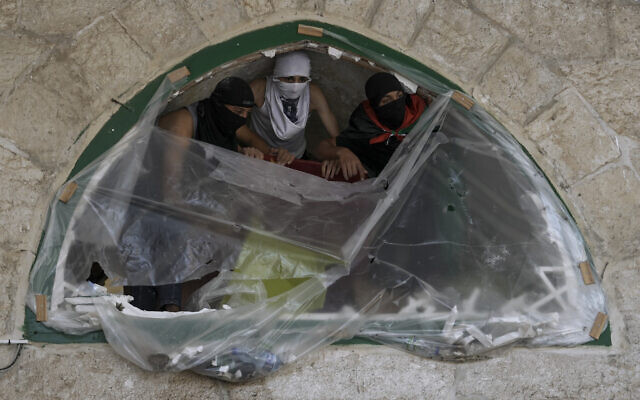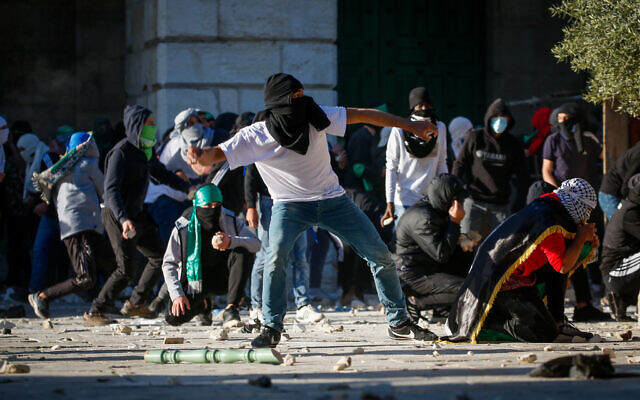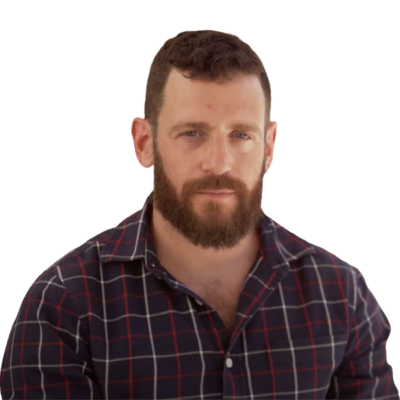The United Arab Emirates, Bahrain and Morocco on Saturday joined in the condemnation of Israel over the previous day’s violence at the Al-Aqsa Mosque compound, where hundreds of Palestinians clashed with Israeli police in scenes akin to those that prefaced last May’s Gaza war.
“The UAE strongly condemned today Israeli forces’ storming of Al-Aqsa Mosque, which resulted in the injury of a number of civilians,” the Gulf state’s Foreign Ministry said in a statement, adding that it “underscored the need for self-restraint and protection for worshipers.”
The statement said it “stressed the UAE’s position that the Israeli authorities should respect the right of Palestinians to practice their religious rites and halt any practices that violate the sanctity of Al-Aqsa Mosque.
“Furthermore, the UAE underscored the need to respect the custodial role of the Hashemite Kingdom of Jordan in accordance with international law and the historical context at hand and not to compromise the authority of the Jerusalem endowment that manages the affairs of Al-Aqsa Mosque,” the statement continued, referring to the Waqf Muslim authorities who administer the religious sites on the Temple Mount.
Morocco, meanwhile, expressed its “firm condemnation of the incursion by Israeli occupation forces into the Al-Aqsa Mosque, their closure of its gates and their aggression against unarmed worshipers in the mosque compound.”
A foreign ministry statement said the kingdom “believes that this flagrant aggression and deliberate provocation during the holy month of Ramadan will only inflame hatred and extremism, and reduce to nothing the chances of any relaunch of a peace process in the region.”
Bahrain’s Foreign Ministry issued a similar statement saying “the Israeli police’s storming of the Al-Aqsa Mosque” and subsequent injury and arrest of Palestinian rioters was “a provocation to Muslims, especially in the holy month of [Ramadan].”
The Gulf states’ condemnations came after the United States expressed its “deep concern” over the violence in Jerusalem, and Israel’s Mideast neighbors, including Jordan, Egypt, Saudi Arabia and Turkey all issued statements of fierce condemnation.
An Israeli police officer lifts his baton in front of the Dome of the Rock during clashes at Jerusalem’s Al-Aqsa mosque compound atop the Temple Mount, on April 15, 2022. (Ahmad Gharabli/AFP)
The UN and EU were more measured in their responses, instead focusing on calling for calm and urging the parties to act with restraint.

Masked Palestinians take position during clashes with Israeli security forces at the Temple Mount in Jerusalem’s Old City, on April 15, 2022. (AP Photo/Mahmoud Illean)
On Friday, hundreds of Palestinians barricaded inside the Al-Aqsa Mosque, stockpiling rocks and other objects to hurl at intruders. Dozens of young people began marching through the compound, some waving Palestinian flags, while others carried green banners associated with the Hamas terror group, police said. The marchers threw stones and set off fireworks.
Officers arrested some 400 rioters and the Palestinian Red Crescent said that 158 were injured — a majority of them likely due to tear gas inhalation. Footage showed chaos at the site, with showers of rocks and fireworks shot toward heavily armed police. Palestinians circulated clips of officers striking protesters, including fleeing women and journalists.
חג חירות שמח יהודים pic.twitter.com/OTaGuk56fg
— Gal Yoffe (@GalYoffe) April 15, 2022
Determined to clear the mosque of the stockpiled stones, police decided to breach the building in what resulted in dozens of arrests and scenes identical to those that unfolded nearly a year ago.
After six hours though, they managed to rid the compound of rioters. Calm was restored and afternoon prayers managed to go off without incident, with some 50,000 Muslim worshipers taking part.

Palestinian protesters hurl stones towards Israeli security forces at the Al-Aqsa mosque compound atop the Temple Mount in Jerusalem’s Old City on April 15, 2022. (Jamal Awad/Flash90)
Ramadan is typically a period of high tension, as tens of thousands of worshipers, including many West Bank Palestinians, attend services at Al-Aqsa Mosque, which sits atop the Temple Mount complex. The site is Judaism’s holiest place, and the mosque is Islam’s third-holiest.
The site is the emotional epicenter of the Israeli-Palestinian conflict and tensions there can easily snowball into wider conflagrations. Hamas and other Gaza-based terror groups have repeatedly invoked the flashpoint holy site as a red line. Police actions to quell riots there last year helped trigger the 11-day war in Gaza in May.
In addition to the holiday friction, Israeli troops have been carrying out extensive raids in the West Bank following the deadliest outbreak of terror in Israel in years.

